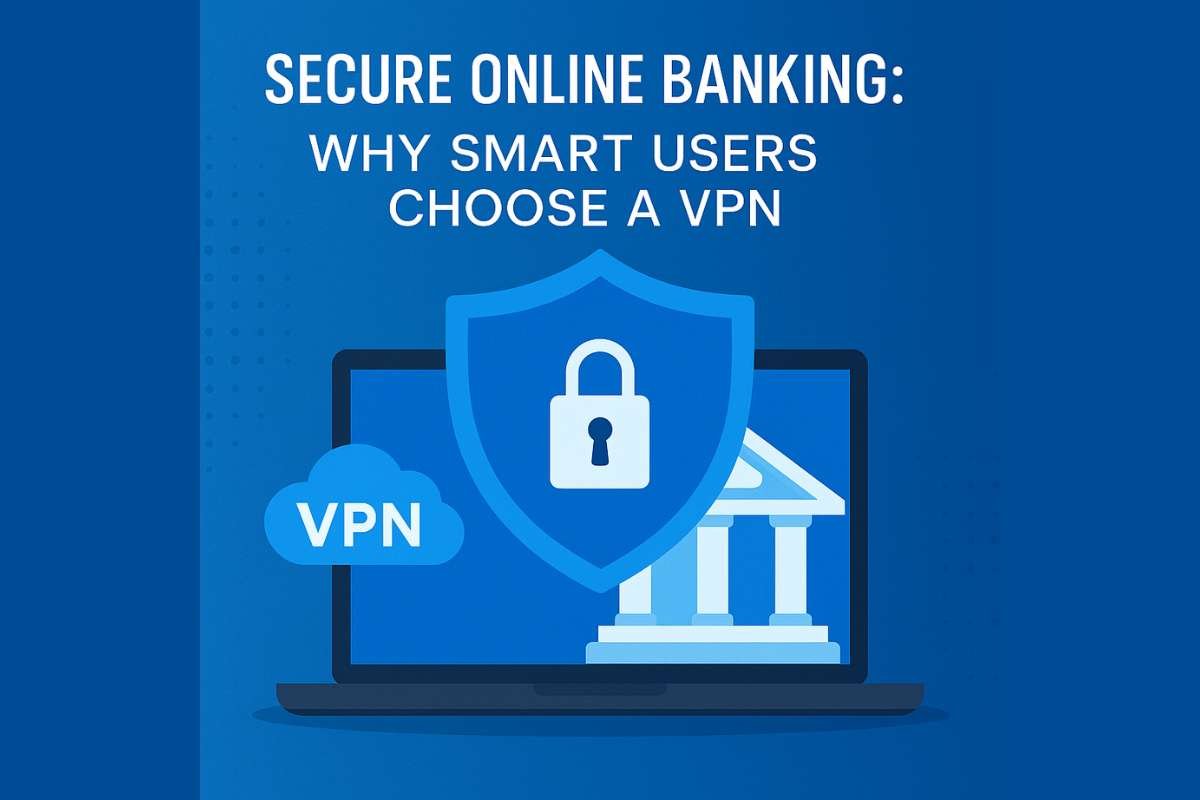Why Online Banking Security Matters More Than Ever?
VPN for Online Banking has become essential in modern financial life. Professionals rely on it when transferring funds between business accounts, entrepreneurs use it to manage payroll securely, and everyday users depend on it while paying bills through mobile apps. This convenience comes with a growing responsibility: ensuring financial data remains safe from digital threats.
Although banks use strong encryption and authentication systems, there are still risks outside the bank’s control. Public Wi-Fi networks, unsecured home routers, and data-collecting internet service providers (ISPs) can expose your online habits in ways most users don’t realize. That’s why more people are taking an additional step to protect their financial information by using a VPN — a Virtual Private Network that encrypts your connection and shields sensitive data.
What a VPN Actually Does (And Why It Helps)?
A VPN creates an encrypted “tunnel” between your device and the internet. Everything you send or receive passes through this tunnel in scrambled form, which makes it extremely difficult for outsiders to read. Encryption helps protect you against:
- Packet sniffing on public Wi-Fi
- Man-in-the-middle attacks
- ISP data collection
- Location-based tracking
- Network-level eavesdropping
When using a VPN, your visible IP address changes to the VPN server’s address. This means your real location remains private, adding an extra shield against targeted attacks.
Well-engineered VPN services — especially those operating under a strict no-logs policy, using modern encryption standards, and offering leak-protection features — can significantly reduce the risk of unauthorized access when banking online.
X-VPN, for example, is known in the industry for using AES-256 encryption, fast global server infrastructure, and built-in DNS and IPv6 leak protection. These are the kinds of features cybersecurity professionals typically recommend when selecting a VPN for sensitive tasks.
Is Using a VPN for Online Banking Safe?

A common question people ask is: Is it really safe to use a VPN for online banking?
The short answer: yes—if you use a reputable, well-maintained VPN.
A VPN does not replace your bank’s security controls; instead, it strengthens your safety on the network level. Banking websites already use HTTPS, but HTTPS cannot prevent:
- Wi-Fi hotspot interception
- ISP-level monitoring
- Local network vulnerabilities
- Metadata exposure
- IP-based profiling
A secure VPN adds encryption across your entire internet connection, not just individual websites. Experts widely agree that using a VPN while banking is safer than not using one, especially on public or unfamiliar networks.
To understand more about how VPNs contribute to safer financial activity, see this helpful guide:
👉Is VPN Safe For Online Banking
When a VPN Matters Most for Your Finances?
While using a VPN is always beneficial, it becomes especially important in the following scenarios:
Public or Shared Wi-Fi
Airports, cafés, hotels, and coworking spaces are prime environments for cyberattacks. Even networks with passwords can be unsafe if many people share the same access point. A VPN encrypts your traffic end-to-end, greatly reducing your exposure.
Remote Work and Business Travel
Remote professionals who manage business accounts or financial systems must be cautious. Unsecured networks abroad or in public areas introduce risks. A VPN keeps sensitive financial activity private, no matter which country you’re in.
Preventing ISP Tracking
Your ISP can see the websites you visit unless you use a VPN. Even though they can’t see inside your bank’s encrypted pages, they still collect metadata about your browsing habits. VPN encryption prevents this kind of data profiling.
Protecting Against Location-Based Threats
If you travel frequently, logging in from unfamiliar IP addresses may raise red flags. A VPN allows you to connect through your home region, reducing login challenges while keeping your connection secure.
How to Use a VPN Properly for Online Banking?
Using a VPN for Online Banking is simple, but following best practices ensures maximum safety and protection for your financial data.
1. Use a high-quality VPN

Choose a service with strong encryption, active security updates, leak protection, and a no-logs policy. Free VPNs are often risky due to weak security practices or data-selling business models.
X-VPN, for example, is known for its consistently updated network and privacy-first approach — both important for banking security.
2. Connect to a server in your home country
Banks sometimes block logins from foreign IP addresses to prevent fraud. Using your local server keeps security alarms to a minimum while maintaining protection.
3. Keep your device security updated
VPN protection can’t cover for outdated devices or unpatched software. Install updates and security patches promptly.
4. Use two-factor authentication (2FA)
A VPN protects your connection, but 2FA protects your account.
Combining both drastically reduces unauthorized access.
5. Avoid multitasking with risky sites
While banking, avoid browsing unknown sites, downloading files, or clicking suspicious links. A VPN helps protect network traffic — but phishing is still a real threat.
Why a VPN Complements (Not Replaces) Bank Security?

Banks are built with strong security architecture — encrypted servers, fraud detection systems, and multi‑layer authentication. Yet, their protection extends only as far as the connection that leads into the bank’s system, which is why using a VPN for Online Banking adds an essential layer of safety.
This is the gap a VPN fills:
- You protect the connection leading to the bank.
- The bank protects the session once you’re inside.
The two work together to create a safer, more private online banking experience. In an era of remote work, global travel, and increased cybercrime, this combined approach is quickly becoming the new standard for responsible digital finance.
Conclusion: Smarter Banking Starts With Smarter Security
Online banking isn’t going away — it’s becoming the norm. With more people working remotely, managing finances online, and connecting through public networks, a VPN has shifted from a “nice-to-have” tool to a practical safeguard.
A trustworthy VPN helps protect your financial data, shields your IP address, prevents ISP tracking, and secures your connection on public networks. And when banking is involved, these protections aren’t optional — they’re essential.
To learn more about how a VPN enhances online banking security, see this resource:
👉 Is VPN Safe For Online Banking
Smart users know that cybersecurity begins with taking control of their own connection. Choosing a reliable VPN for Online Banking is one of the simplest and most effective tools available today — and it has become a vital part of modern financial safety.


















